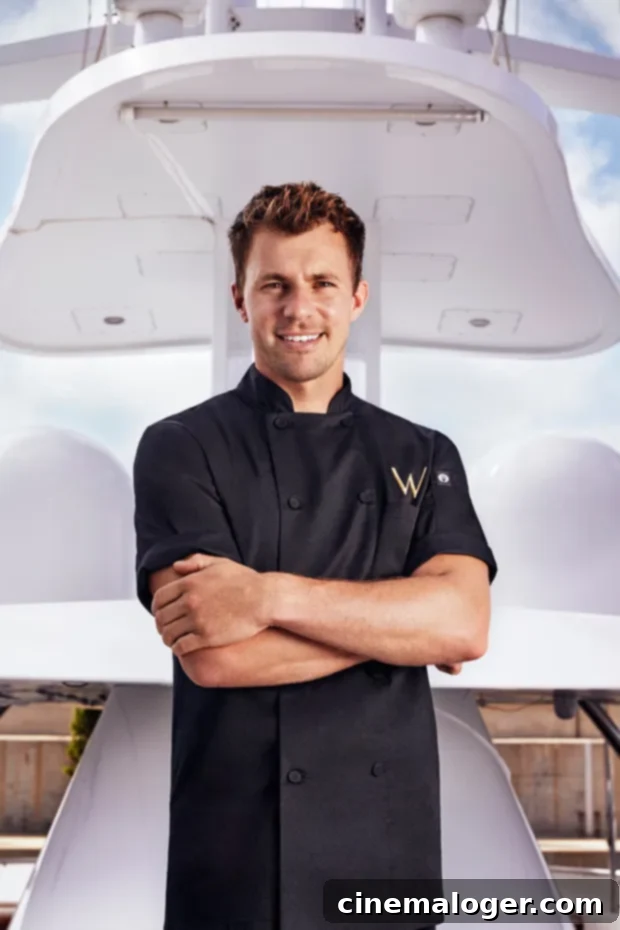Below Deck Med: Chef Tom Checketts’ Kitchen Meltdown Over Raw Lobster Ignites High-Stakes Culinary Drama
The pressure cooker environment of a superyacht galley is renowned for testing even the most seasoned culinary professionals, but few moments encapsulate this intensity quite like a chef’s breaking point. In an exclusive preview of the highly anticipated August 17th episode of Below Deck Mediterranean, viewers are given an unfiltered look into the escalating tensions as new chef Tom Checketts faces a nightmare scenario: guest complaints about “raw” food. This incident not only threatens to derail a crucial charter but also puts Chef Tom’s reputation, and perhaps his relationship with Malia White, squarely on the line, showcasing the immense challenges of high-end yachting.
Stepping into the role of superyacht chef on board The Wellington was undoubtedly a significant career move for Tom Checketts, yet the initial excitement appears to have quickly given way to profound frustration. The latest culinary crisis unfolds when Chief Stew Christine “Bugsy” Drake delivers unwelcome news from the dining table: plates of lobster, deemed “too raw” for the discerning guests’ palates, are being sent back to the galley. Tom’s immediate reaction is one of incredulous annoyance, asserting that the lobster is “fully cooked” and merely prepared using a poaching method. This stark difference in perception—between a chef’s technical execution and a guest’s expectation—highlights a fundamental challenge in luxury hospitality, where subjective taste can override objective cooking standards.
The situation quickly spirals beyond a simple disagreement about cooking techniques. For a chef of Tom’s caliber, having food returned is not just an inconvenience; it’s a direct challenge to his professional pride and expertise. The pressure to deliver perfection under tight constraints, often with limited resources and equipment, defines life in a yacht galley. Guests on a luxury charter expect nothing less than Michelin-star quality, and any deviation can lead to significant repercussions, from diminished tips to damaged reputations for the entire crew and vessel. This particular incident, focused on a premium ingredient like lobster, magnifies the stakes, pushing Tom further into a state of visible exasperation.
The saga of the undercooked lobster intensifies as Tom is forced to re-address the dish, despite having already dedicated two hours to its initial preparation. The necessity of re-cooking not only wastes precious time but also introduces an element of chaos into an already demanding service. Adding fuel to the fire, a seemingly minor but significant hurdle arises: Tom’s frantic search for a potato for another dish yields no results, exacerbating his palpable frustration. In the high-stakes environment of a yacht kitchen, even the smallest logistical hiccup can feel like a monumental obstacle, pushing a chef closer to the edge. Christine and his girlfriend, Malia White, attempt to offer assistance, but their efforts are met with a wall of intense frustration from Tom, who is clearly overwhelmed by the confluence of challenges.
The constant demands, confined spaces, and lack of familiar resources on a superyacht can be incredibly taxing. For a chef accustomed to professional, well-stocked kitchens, the adjustments required on a yacht are immense. This incident with the lobster, combined with the missing potato, represents a tipping point for Tom, where the cumulative stress of the job begins to manifest in overt anger and self-doubt. His passion for cooking and dedication to his craft are evident, but these very qualities also make him acutely vulnerable to setbacks and perceived failures, especially when they occur on such a public and scrutinized platform as Below Deck Med.
Amidst the culinary chaos, Tom articulates his deep regrets regarding his decision to join The Wellington crew. “This isn’t what I thought I was signing up to when I came to visit Malia and was offered the job,” he confesses in our exclusive preview. This statement reveals the underlying personal dimension to his professional struggles; his presence on the yacht is intimately tied to his relationship with Malia. When the situation seems beyond salvageable, Tom’s composure completely shatters. “I can’t believe this. It’s just a f**king laughingstock,” he laments, his words dripping with humiliation and exasperation. This raw outburst underscores the immense pressure he feels to perform, and the crushing weight of feeling that his efforts are being undermined or, worse, made a mockery of.
Tom’s emotional response resonates with anyone who has ever felt their professional integrity questioned or their best efforts unappreciated. For a chef, the kitchen is often a sanctuary, a place where creativity and skill combine to produce joy. When that sanctuary is invaded by complaints and perceived failures, it can feel like a personal attack. His choice of words, “laughingstock,” highlights the severe blow to his pride. This is not just about a single dish; it’s about his professional identity and the respect he believes he has earned through years of hard work and dedication in the culinary world. The very public nature of Below Deck Med only amplifies these feelings, turning a private kitchen crisis into a televised spectacle.

Recognizing the severity of Tom’s emotional state, Malia pulls her boyfriend aside, hoping to de-escalate the situation and provide some much-needed perspective. However, Tom remains deeply entrenched in his despair. “What’s the point in me being on the boat if it’s not going to be right what I serve?” he questions, his voice heavy with resignation. He confides in Malia, declaring the entire ordeal “bullish*t. And suicide,” powerful words that convey the depth of his disillusionment and the extreme mental toll the job is taking. Malia attempts to reassure him, reminding him that lunch was “amazing,” a testament to his overall culinary prowess. Yet, Tom dismisses this, explaining that even if it was successful, it was “more complicated than it needed to be,” hinting at the unnecessary hurdles he faced. “I’m good at what I do. I don’t need to prove it,” he asserts to Malia, a desperate plea for validation mixed with a firm belief in his own abilities. He concludes with a definitive statement that speaks volumes about his current state of mind: “I’ve made a f**king big mistake. I’ve got way too much self-respect to do this.”
This conversation with Malia is crucial, offering a glimpse into the personal cost of working in such a high-pressure environment. Tom’s declaration about his “self-respect” underscores a chef’s unique vulnerability; their identity is often inextricably linked to their output. When that output is criticized, it’s not just a professional critique but a personal affront. His regret about joining the crew, explicitly stating it was a “mistake,” goes beyond a momentary frustration. It suggests a deeper conflict between his personal values and the demands of this particular role on Below Deck Med. The dynamic between Tom and Malia also adds another layer of complexity, as Malia is torn between supporting her boyfriend and maintaining a professional distance in a high-performing crew. This tension is a recurring theme in reality shows, where personal relationships are tested under the scrutiny of cameras and professional expectations.
The challenges faced by Chef Tom are not isolated incidents but reflect a broader pattern within the Below Deck franchise, where the galley often becomes a focal point for drama. Chefs frequently grapple with demanding guest preferences, unexpected dietary restrictions, limited provisions, and the sheer logistical nightmare of preparing gourmet meals in a constantly moving, compact kitchen. Previous seasons have seen chefs struggle with similar issues, from demanding theme nights to guests requesting dishes outside their usual repertoire, all of which contribute to the intense pressure that can lead to meltdowns, walk-offs, and dramatic confrontations. Tom’s situation is a powerful reminder that while the lifestyle appears glamorous, the work is incredibly arduous and emotionally draining for every crew member, especially those in leadership roles.
Beyond Tom’s culinary crisis, the August 17th episode of Below Deck Med promises even more riveting storylines, making it a super-sized viewing event. The official synopsis hints at significant developments across the board: “With Hannah’s back against the wall, Captain Sandy faces a difficult decision that could change the trajectory of The Wellington.” This alludes to the ongoing, season-long tension involving Chief Stew Hannah Ferrier, suggesting a pivotal moment that will have lasting repercussions for the crew and Captain Sandy Yawn’s command. Furthermore, “Bugsy grapples with a new challenge,” implying that her role as Chief Stew will test her mettle beyond just handling guest complaints about the food. And Malia’s worries about Tom extend beyond just this incident, as the synopsis states she “worries about Tom’s ability to navigate a chaotic first charter.” This indicates that Tom’s struggles are not momentary but rather a deeper concern for Malia, given the demanding nature of their initial charter period. This particular episode is set to air at 9 p.m. on Bravo, and with so many intertwined dramas reaching a boiling point, it is undoubtedly an episode that fans of Below Deck Mediterranean will not want to miss.
The upcoming episode is poised to be a dramatic turning point for several key crew members, highlighting the intricate web of personal and professional relationships that define life on a luxury yacht. From culinary catastrophes to leadership quandaries, The Wellington’s journey continues to be anything but smooth sailing. Viewers can expect an intense exploration of how these professionals cope under extreme pressure, and how their choices impact not only their own careers but the success of the entire charter. Be sure to tune in for what promises to be one of the most explosive episodes of the season.
